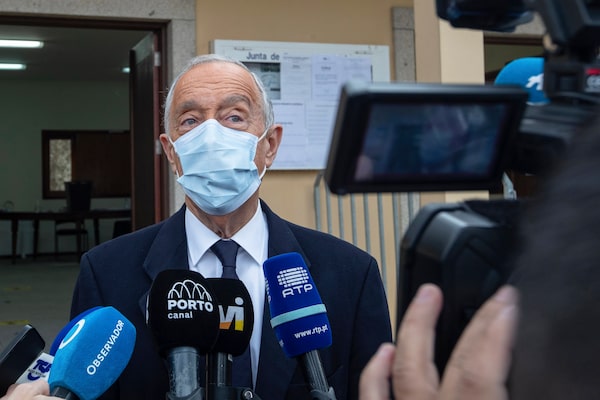
Portuguese President Marcelo Rebelo de Sousa speaks to journalists after voting at a polling station in Celorico de Basto, northern Portugal, Jan. 24, 2021.Luis Vieira/The Associated Press
Portugal’s centre-right President Marcelo Rebelo de Sousa won a second term on Sunday, exit polls showed, in an election marked by strict health and safety rules as the country battles a crippling third wave of coronavirus contagion.
Polls by leading TV stations TVI, RTP and SIC gave 72-year-old Rebelo de Sousa, a former television commentator known for his warm persona, 56-62 per cent of the vote, well above his 52-per-cent win in 2016.
Left-wing candidate Ana Gomes and far-right lawmaker Andre Ventura were vying for a distant second, with polls giving Ms. Gomes 13-17 per cent of the vote and Mr. Ventura, whose Chega party garnered just 1.3 per cent of the vote in a 2019 parliamentary election, 9-14 per cent.
The President holds a largely ceremonial role but can veto certain laws and decree states of emergency, a power Rebelo de Sousa deployed often during the pandemic, following the lead of parliament..
The Portuguese voted masked, socially distanced and each using their own pen as councils took extensive measures to prevent contagion during the voting process.
Still, almost two-thirds of Portuguese thought the election should have been postponed because of the pandemic, a poll last week by research institute ISC/ISCTE showed.
“Since the date of the elections wasn’t changed, I decided to come early,” said Cristina Queda, 58, who arrived at her polling station in Lisbon as soon as it opened at 8 a.m. to “avoid groups and queues.”
The country of 10 million people is reporting the world’s highest seven-day rolling average of new cases and deaths per capita, according to Oxford University data tracker www.ourworldindata.org.
The number of COVID-19 deaths broke records for the seventh day in a row on Sunday at 275, with hospitalizations also at an all-time high and ambulances queuing for several hours at Lisbon hospitals full to capacity.
Pollsters predict record numbers of abstentions, in part because 1.1 million voters from abroad were added to the electoral register for the first time – but also because hundreds of thousands of voters are themselves in quarantine.
Casting his vote at a Lisbon school, Prime Minister Antonio Costa said “everything was done for people to be able to exercise their democratic right to vote,” despite the country being at a very grave stage of the pandemic.
Our Morning Update and Evening Update newsletters are written by Globe editors, giving you a concise summary of the day’s most important headlines. Sign up today.